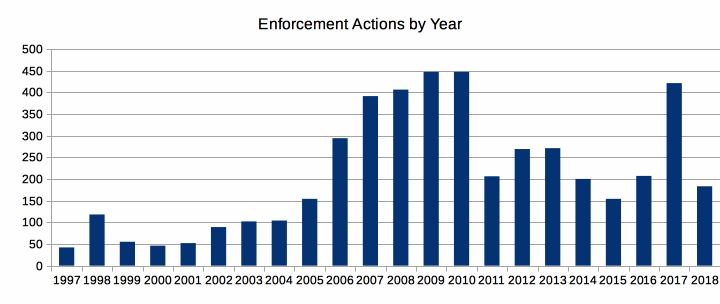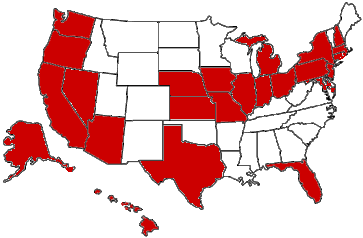This is unusual: the Federal Communications Commission has instigated a civil lawsuit in the Western District Court of Texas against Walter Olenick and M. Rae Nadler-Olenick, the proprietors of “Texas Liberty Radio,” which until late last year occupied 90.1 FM in Austin, Texas.
The facts are fairly clear: sometime in 2013, the FCC received a complaint about Texas Liberty Radio’s existence. That August, field agents from Houston traveled to Austin and found the station, measured its power, and confirmed it did not have a license. The recently-filed court documents contain some hand-written notes from field agents about the station, including the possible apartment it was broadcasting from, license plate numbers of cars in the parking lot, and notes on the station’s programming, which field agents noted included stuff from “Alex Jones” and “infowars.” Continue reading “FCC Sues Unlicensed Station to Collect Fine”
Category: Microradio
Coloradans Push Back Against Anti-Pirate Bullying
FCC Commissioner Mike O’Rielly doesn’t seem to be getting the kind of publicity he hoped for after taking a hyperlocal news outlet in a suburb of Boulder, Colorado to task for reporting on the existence of a pirate radio station there. The Longmont Observer ran a short piece back in December noting the existence of Green Light Radio, the FCC’s protocol for shutting such stations down, and ending with the statement, “In the meantime, enjoy Longmont’s pirate station while it lasts.”
This stuck in O’Rielly’s craw so badly that he penned a letter to the editor of the Observer admonishing it for providing “tacit support” to an unlicensed broadcaster. In O’Rielly’s mind, the Observer’s journalists should have acted as freelance FCC agents and not only reported the station to the agency’s field office in Denver, but encouraged readers to not listen to “KGLR,” due to the supposed “harm” it would cause.
A follow-up article in the Boulder Daily Camera newspaper (and its Longmont affiliate, the Times-Call) seems to suggest that Coloradans don’t appreciate O’Rielly’s scolding. According to Brooke Ericson, O’Rielly’s chief of staff (who, incidentally, has been in the job for less than four months and most likely ghost-wrote the letter to the Observer to score points with her new boss), this was “the first article (he) has come across that appeared to actively promote this illegal activity,” and thus justified a response. Continue reading “Coloradans Push Back Against Anti-Pirate Bullying”
Nodes of Resistance: Sampling the Haitian Diaspora via FM+Internet
17 years ago(!), I left a budding career in radio journalism out of disgust with the trajectory the industry was taking. The break-point came when the National Association of Broadcasters and National Public Radio teamed up in Congress to conduct a disinformation campaign designed to eviscerate the FCC’s then-newly proposed LPFM radio service.
However, A few months before I actually quit my job, I acquired all the components necessary to start an unlicensed microbroadcast station. “System P” was a 40-watt frequency-agile FM rig that used a portable military surplus antenna mast to conduct tactical broadcasts from a wide variety of locations. You could often hear the station in Madison, Wisconsin, primarily on evenings and weekends; but since the station was mobile much fun was had taking it to peoples’ homes and public events around the country to give the public a more substantive appreciation of the ease by which it could make “the public airwaves” very real.
Another key element of System P was to provide a last-mile node for what was then quite an experiemental webcast-activism scene (today commonly known as “livestreaming”). These often manifested in Independent Media Centers during times of protest, most notably against corporate global trade deals. Activists would converge on a city to fill the streets in order to disrupt the negotiation of these agreements, and the media coverage would invariably skew toward painting the activists as violent thugs and police/other security forces as the guardians of order. But when activists gained the ability to counteract this narrative – oftentimes by live reports from the streets directly – the discursive dynamic around these events changed. Continue reading “Nodes of Resistance: Sampling the Haitian Diaspora via FM+Internet”
Prepping for a Pirate Crackdown
Even though the FCC’s Enforcement Bureau is in the throes of a major downsizing – newly-released documents indicate the Bureau will cut 44 jobs, or more than 40% of its workforce – it’s also committed itself to do something about the proliferation of unlicensed broadcasting. That said, a before-and-after summary of personnel cuts doesn’t really show a lot of refocused muscle on the ground: for example, New York’s field office will see a net increase of one agent (from 4 to 5), while the “tiger teams” being created to backstop the field offices consist of no more than three or four.
Since pirate radio’s become a plaything of FCC Commissioner Mike O’Rielly, and the broadcast lobby is chomping at the bit for a war on pirates, I would not be surprised if the agency, working in concert with groups like the NAB and New York State Broadcasters Association, attempt to sweep at least NYC this year in some “show of force.” Whatever the rhetoric may be, paper-tiger mode remains in full effect — and there’s a lot unlicensed broadcasters can do to prepare for whatever may come, both tactically and strategically. Continue reading “Prepping for a Pirate Crackdown”
Radio in Times of Crises
When flooding rains pounded Texas earlier this summer, many communities found themselves in crisis. With wired network infrastructures flooded and unusable and power a sometimes-thing draining the battery-packs at cell tower-sites, many Texans found themselves reaching for their radio to find out what was going on.
One area that was hit very hard by the rains was Austin and surrounding towns, including Wimberley, Texas: flash-flooding sent a wall of water down the Blanco River in the Wimberley Valley on Memorial Day weekend that swept away entire structures, killing several people and doing millions of dollars in damage. Just a couple of years earlier, folks there had founded a non-profit organization to apply for an LPFM license. Construction permit in hand, when the rains came and wiped out most other community communications they did not stand idly by. Continue reading “Radio in Times of Crises”
O'Rielly Encourages War on Pirates
When FCC Commisioner Mike O’Rielly spoke last week to the summer conference of the New York State Broadcasters Assocaiation, he made pirate radio the lead-off topic, sending a clear signal that the Commission is responding to recent Congressional pressure and industry lobbying on the issue. How that response will manifest itself is yet to be determined, but any viable effort will have to involve thinking outside the box about how to be better spectrum-cops.
“Far from being cute, insignificant, or even somehow useful in the broadcasting ecosystem,” said O’Rielly, “pirate radio represents a criminal attack on the integrity of our airwaves, at a time when spectrum has become more scarce and precious than ever before.” He compared unlicensed broadcasters to “poison ivy in a neglected garden” and estimated that nearly one-quarter of all pirates in the country reside in the New York area (data, please!). Continue reading “O'Rielly Encourages War on Pirates”
Massive Cuts Planned to FCC Field Enforcement
A very interesting memorandum was leaked last week to two trade publications detailing a plan to severely reduce the FCC’s enforcement presence in the field. Presently, the agency’s Enforcement Bureau has two dozen field offices scattered throughout 17 states and Puerto Rico. However, not every field office is created equal: there are Regional Offices (many employees), District Offices (a handful of employees) and Resident Agent Offices (one or two people).
According to the American Radio Relay League, two-thirds of all FCC Enforcement Bureau offices would be closed, leaving just half the staff (33 people total) in the field. And their management is positively evicerated: reduced from 21 positions to just five. Continue reading “Massive Cuts Planned to FCC Field Enforcement”
FCC Steps Down Anti-Pirate Enforcement
Just updated the Enforcement Action Database and the signs are pretty clear: unlicensed broadcasting has slipped down the priority-list for FCC field agents. Actions against AM/FM and shortwave pirate stations last year were at their lowest level since 2005, the last time fewer than 200 were logged.

Tactically, even the agency’s penchant for paperwork seems to have slackened. Continue reading “FCC Steps Down Anti-Pirate Enforcement”
Pop-Up Station Pays Homage to TOUCH FM
When the FCC raided TOUCH FM in Boston this spring, many lamented its demise. But its frequency didn’t stay silent for long: less than two months after the FCC’s sweep of the city, a pop-up station temporarily reoccupied 106.1 FM.
Noises Over Norwell broadcast from a two-story home in Dorchester currently under the receivership of Fannie Mae. Its former owners moved back in with the assistance of City Life/Vida Urbana, a grassroots organization dedicated to fighting economic injustice in Boston. The station was a cornucopia of information, discussion, and creativity about the state of the economy and the surrounding neighborhood; when "dormant," you simply heard the ambient sounds of a lived-in home. Continue reading “Pop-Up Station Pays Homage to TOUCH FM”
FCC Enforcement in 2013: No Great Crusade
The federales ended their unlicensed broadcast enforcement activity with a whimper last year, apparently taking the month of December off completely. The entirety of 2013 saw 249 FCC enforcement actions, a slight reduction from 2012 levels.
 Overall, the FCC was active against pirate stations in 24 states and the District of Columbia, and more than 90% of those stations involved were on the FM band. The vast majority of enforcement activity was concentrated on the coasts, with New York and New Jersey being the hottest spots for pirates—as evidenced by the major sweep the FCC did there in July. (For what it’s worth, there’s been no material change in the number of FM frequencies occupied by interlopers on my own radio dial here in Brooklyn.) Continue reading “FCC Enforcement in 2013: No Great Crusade”
Overall, the FCC was active against pirate stations in 24 states and the District of Columbia, and more than 90% of those stations involved were on the FM band. The vast majority of enforcement activity was concentrated on the coasts, with New York and New Jersey being the hottest spots for pirates—as evidenced by the major sweep the FCC did there in July. (For what it’s worth, there’s been no material change in the number of FM frequencies occupied by interlopers on my own radio dial here in Brooklyn.) Continue reading “FCC Enforcement in 2013: No Great Crusade”